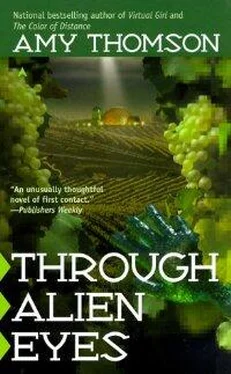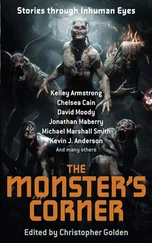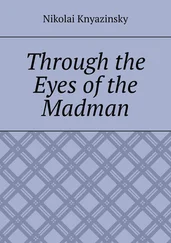The door to the garden hissed open as Moki approached it, and Ukatonen’s nostrils flared*wide at the welcome scent of green growing things and freshly dug soil. His skin flared turquoise with pleasure at the smell. This was the only living place on the whole ship. Even the hydroponic area, where most of the fresh food was grown, seemed eerie and mechanical; the plants’ growth was forced and artificial. Here, things grew at their own pace, in soil, not a chemical solution. Ukatonen felt himself relax as he walked through the door.
The humans were already at work. The gardeners straightened up and stared as the Tendu came in. Ukatonen could sense the humans’ discomfort at their presence. Several of them glanced away. Human emotions were still very hard for him to read. Were they embarrassed, angry, frightened? What were he and Moki doing to cause the humans this continual uneasiness?
One of the humans, a female, her hair shot through with the silver threads that marked an elder, set down her tools and stepped forward, her arm extended in greeting. She seemed more self-possessed than the others, but Ukatonen thought he detected traces of the same awkwardness, more carefully concealed.
“You must be the Tendu,” she said. “My name is Giselle.”
Ukatonen nodded. “How is it spelled?” he asked.
She wiped her hands on her trousers, pulled out a pad of paper, and wrote her name on it. Moki peered over her arm to see what she was writing.
“Thank you, Giselle,” the enkar responded, spelling out the words on his skin. “My name is Ukatonen, and this is Moki. Thank you for showing us the gardening atwa. We are honored to learn from you.”
“You’re welcome. I’m honored to be teaching you,” she replied with a smile. She picked up a tray of soil containing small plants. The plants had wide dark green leaves dappled with small white spots that looked like little stars. “This way,” she said beckoning them forward with a movement of her head.
She led them over to a patch of churned-up ground. It smelled rich and full of humus and nutrients, much more fertile than the red jungle soil that Ukatonen was used to. It was more like the soil they made for the dry season treetop plantings, compounded of mud and refuse from the bottom of a na tree, mixed with composted leaves and some coarse river sand. He stuck a spur into it, and nodded. “It’s good soil,” he said.
“We compost most of our waste and put it back into the soil,” Giselle told him.
“I would like to see how that is done sometime,” Ukatonen said.
Giselle shrugged. “Compost is compost. If you really want to see it, I’ll show you the recycling facility sometime.”
“Thank you, I’d be honored,” Ukatonen said.
“Sure,” Giselle returned. “Now, here’s what you do.”
She neatly transplanted one of the plants with a small metal tool, explaining what she was doing as she worked. Ukatonen’s ears lifted and clouds of pink and lavender crossed his body in surprise and relief. He had done this before, every dry season.
“What kind of plants are these?” Moki asked Giselle.
She smiled, “They’re melon plants. It’s a variety called Moon and Stars. It’s one of my favorites. Not only does it produce delicious fruit, but it’s pretty as well.”
Ukatonen’s ears lifted. “You grow plants because they look pretty?” he asked.
“Of course,” she said “Otherwise we would just be raising crops. We want this area to look beautiful, but it’s nice if we can grow some fresh food here as well. Gardening is all about growing plants in arrangements that are beautiful to look at, nice to smell, or even pleasant to touch.”
Giselle ran her hand along the branch of a small shrub, releasing a sharp and pungent aroma. She held her hand out to Moki. “Here, smell.”
Moki sniffed her hand. Ukatonen could see the nictitating membranes flick over his eyes as he did so. It was a good smell, but powerful. Giselle didn’t realize how overpoweringly strong the smell was to a Tendu.
“It’s rosemary,” Giselle explained. “We use it in cooking to add flavor to food, but it also smells wonderful.” She knelt beside a silvery grey plant, and stroked one of its leaves. “Feel this,” she told Ukatonen.
He reached down and felt one of the plant’s soft, furry leaves.
“We call this plant lamb’s ears, because the leaves feel as woolly and soft as the ears of a lamb.”
“Oh. So how does it taste?” he asked.
“It’s not edible,” she said. “We grow it because it looks pretty and feels nice.”
Ukatonen shook his head in puzzlement. It seemed a very strange reason to grow plants. Perhaps plants on Earth were uglier than those on Tiangi and needed more help to look nice.
Moki picked up a plant and a trowel.
“How far apart should they go?” Moki asked. Giselle showed him, and the two Tendu began gently easing the plants into the soil. The gardener watched them for a few minutes.
“You’ve done this before.”
“During the dry season, we build platforms in the trees, put soil on them, and grow food plants. In the rainy season the platform rots away and the dirt is washed onto the ground, where it nourishes the soil of the forest. Some trees have roots on their branches that we weave together to make the platforms. They draw nourishment from the soil we put on them,” Ukatonen told her.
“I didn’t realize that the Tendu farmed.”
“Only during the dry season,” Ukatonen said.
“I hope you’ll tell me more about it, when we have the time.”
“Of course, I’d be glad to,” Ukatonen replied.
Giselle thanked him, and left them to their work.
It was a satisfying task. The soil, rich and moist, was a pleasure to work in. The plants would prosper. Moki touched his arm and Ukatonen looked up. A small pink animal wriggled in his palm. Except for the color, it looked much like a yetilye, an orange worm that ate decaying leaf matter and tiny soil organisms. The yetilye aerated the soil and fertilized it with their droppings.
“What is it?”
Ukatonen stuck a spur into it. It had the distinctive metabolic profile of an Earth animal. “I don’t know. Ask Giselle what it is.”
The creature was called an earthworm, and it did much the same thing as a yetilye.
Moki described the yetilye to Giselle. “Why is the earthworm so much like it?” he asked.
“That’s a good question. It’s probably because the two creatures live in the soil and eat pretty much the same thing, even though they’re on two different planets.”
“Ah,” Ukatonen said. “They occupy the same ecological niche.”
“Yes, they do,” Giselle said, her eyebrows lifting. “Certain kinds of animals seem to occur over and over again on other living worlds. There is a large oceanic predator called a shark on Earth. A similar predator occupying a similar niche seems to turn up in every suitable ocean. The details of the skeleton, skin, and organs vary, but they are all much the same shape. Even their teeth are similar. I understand that the oceanic Survey team caught several sharklike animals on Tiangi. There are pictures in the Survey report. Perhaps you could identify them sometime.”
“I would be glad to try, but first we must finish planting the Moon and Stars,” the enkar said with a ripple of amusement.
Giselle grinned at his joke. “And once that’s done, we need to do some weeding,” she said, patting him on the shoulder. Ukatonen stiffened at the familiarity of this gesture, and he saw Giselle draw back.
“I’m sorry,” she said. “I forgot myself.”
“It’s all right,” Ukatonen assured her. “You humans do the same thing when we touch you.”
Giselle looked embarrassed.
“It’s all right,” Ukatonen said again. “We just have to learn to get used to each other.”
Читать дальше

![Корнелл Вулрич - Eyes That Watch You [= The Case of the Talking Eyes]](/books/32103/kornell-vulrich-eyes-that-watch-you-the-case-of-thumb.webp)










